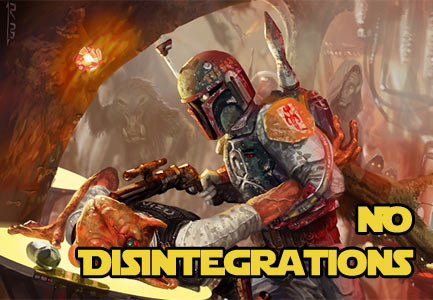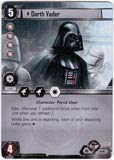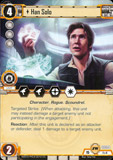Welcome to Card Game DB
Register now to gain access to all of our features. Once registered and logged in, you will be able to create topics, post replies to existing threads, give reputation to your fellow members, get your own private messenger, post status updates, manage your profile and so much more. If you already have an account, login here - otherwise create an account for free today!
Register now to gain access to all of our features. Once registered and logged in, you will be able to create topics, post replies to existing threads, give reputation to your fellow members, get your own private messenger, post status updates, manage your profile and so much more. If you already have an account, login here - otherwise create an account for free today!
No Disintegrations
Mar 18 2013 05:00 PM |
Ketricel
in Star Wars
Star Wars No Disintegrations Ketricel An Introduction
An IntroductionSo I bet most of you are wondering who this joker is, and the simple answer is I am Ketricel. I have been playing Trading Card Games since Pokemon first came out and have bounced around from game to game since then. Since I am a huge Star Wars fan I dabbled in the SWCCG (Decipher) for a while but unfortunately I caught it near the end and was not able to play for long. With mixed feelings I picked up and started playing the SWTCG (WotC); which is where I met Darksbane, and despite the flaws in the game kept playing up until and through its cancellation helping found the Star Wars Independent Development Committee that to this day has done a good job keeping the game going. Sadly because of personal commitments (aka work and family) I had to step away from card games for a few years and have missed them ever since. Happily with the announcement of the Star Wars LCG I have found a new passion for my card game addiction. Getting back into a newly starting card game is a very exciting and rewarding venture and I hope to be around and involved in the game for a long time.
One of the things I greatly enjoy doing is writing about the games I currently am playing; be it deck tech, tournament reports, card reviews, or general strategy . Being able to impart my wisdom and insight to others is a very rewarding thing for me to do and I have been lucky to find outlets for this for many years and I know that bringing my passion to the CardGameDB.com team will prove equally as rewarding. Thank all of you for being such a welcoming and lively community, without you guys none of this would be possible!
Deck Building Guidelines
This week we are going to tackle an issue that many people always ask; what the trickiest part of playing a card game is. My response is always the same; deck building!! Below I have listed the 8 simple guidelines for deck construction that I have found valuable during my years of playing card games. I learned all these pointers from watching and learning from the better players in the countless games I have played over the years, and also from my own personal experience. Many of the best players use them, and it's really what you will fall back on when building a deck.
1) As close to 50 cards as you can get — Though some claim to be able to have decent decks of with countless cards over the minimum, the best thing to do is keep it as close to 50 as you can get. This is so you don't run into setup clogs that mess up many games for over sized decks before they ever get started. The worst feeling is drawing dead cards in your opening hand, while not a single unit this isn't always a good thing and could hamper your overall deck strategy. The unique draw mechanics offered within the SWLCG somewhat temper the extreme negatives that this can at times mean from other games. Being able to draw up to 6 cards each turn means that during any given game you should be able to draw upwards of half of your deck. This differs greatly from other games that limit you to drawing 1-2 cards per turn baring other effects. While this means that in the SWLCG you will see a greater portion of your deck, it doesn't mean that you automatically can disregard streamlining your deck.
2) Multiples of important units and synergy units — Usually 3-4 copies of each important card in your deck is a good idea, with the unique way that FFG has gone about deck construction this usually is limited to 2 copies of most cards for the foreseeable future. "Synergy" refers to when a card's effect references names or affiliations that are in your deck, or just good combos (see below). By having those cards, you can dig through your deck for important units (letting you minimize the number of important units you need), reduce their costs, increase their power, defense, card draw, gain endurance drain endurance, and hamper your opponent's capabilities in any or all ways. By having multiple copies of these important units you greatly increase your percentages of having them on a consistent basis.
3) Use all available tools — Resources, units, events, and fate cards are your vital resources. Make it a goal to use the most efficient engines for making these resources stretch the furthest. Being able to consistently pay for and deploy units is key to keeping board presence in any card game. Having the initiative allows you to do a lot, but also being able to use your opponents initiative against them goes a long way in helping you to eventually win the game. Being able to win an edge battle on your opponents turn can go a long way in shifting the tide in a close match. Draw tools include being able to increase how many cards you draw each turn, as well as card hunters (a.k.a, deck-thinners, digging the units that you need out of your deck, and thereby reducing the variety to draw in your deck). Without a good draw engine, you'll find it hard to make your deck work with most themes. Again the creative way that FFG has gone about their draw mechanics means that in a given game you should be able to go through a large portion of your deck on a fairly consistent basis. The draw engine is quite literally the life of your deck.
4) Maintain a theme — Keep a theme in mind such as Imperial Big Navy, Sith Control, Rebel Weenie Rush, Card Denial, etc., when building your deck. The theme is the trick or strategy by which you gain an advantage over your opponent. These can either focus on helping you, or on hindering your opponent. Though themes can often be mixed and matched, one theme should remain pervasive. Other theme types include: gambit (sacrificing units to gain an advantage, such as the use of Leia Organa (10-2)), swarm, stall, resource denial, defensive, card denial, ambush (attacking without letting your opponent strike back, possibly using a card like Emperor Palpatine (23-2)), and many more.
5) Combos — More than synergy, combos are cards that just rock together, creating effective and useful tools, such as the Battlefield Engineers/Heavy Blaster Emplacement damage engine. Some of the best players in countless other games, have made many top tier decks by sifting through every card in their collection, looking for possible combos and then adjusting their decks until they make the combo work at maximum efficiency. It takes a lot of time, but the end result is very rewarding. It is figuring out how to maximize the effectiveness of an already existing combo that can bring great glory or great demise for many players.
6) Watch trends and analyze the decks of tournament winners and all around good players — When each set comes out, a new group of cards take the top of the food chain. When this happens, it's important to analyze them, find out what makes them so good and how to use them to maximize their effectiveness. Analyze the decks of winners of tournaments (such as those in the CardGameDB or FFG forums article archive), and the decks of excellent players you know. The most successful players use what works. You shouldn't need to reinvent the wheel every time you build a deck. Don't be afraid to use a pre-existing deck. Make adjustments to it to suit your playing style.
7) Anticipate and counter your opponents' decks — Like rule number 6, it's important to know what the card and combo trends are and how frequently they're used and the themes that they work best with. These will include combos, synergies, stand-alone units, resource/draw tools, and theme enhancers. By knowing this, you can figure out how to counter those things. If you come up with a new combo, figure out how to destroy it. Knowledge is power. Not only will you learn how to defeat someone else who uses it, but you'll know how to protect it for yourself as well, because you're opponents will also be looking to counter those cards, because you're using them.
8) Develop your playing style — Your own personal playing style is important to building a deck. When you notice a weakness in your playing style, take it seriously and seek to do something about it. When you find a weakness, find out how to change your style to play better. If you find you can't change it, find a way around it. This is usually done by changing out cards, because it's often particular cards, and our ability to play them, that cause the problems. Because if you don't exploit your own weaknesses and weed them out, your opponent will find them and use them against you every single time.
With all this being said deck design is not easy. There have been whole teams of players dedicated to deck design for the purposes of coming up with that one good deck to win a single tournament with, so it's clear that it may take some time to become competitive outside of your living room table. Becoming good at anything requires three things: 1) patience, 2) knowledge, and 3) careful planning. Each are important during game play and each are important during deck creation. Today we focus on improving these things in deck creation. If you are new to the game or simply find that you have trouble competing in the current environment, you should consider these things. They can mean a great deal to the success of your deck.
Perils of Deck Creation
Impatience and a lack of knowledge and careful planning are common traits of new or inexperienced players in any card game and these same flaws can even effect the best of us at times. These traits are demonstrated in the mistakes that are made and they usually start from the ground floor; deck building. Below is a list of the most common mistakes of new players, each with a brief discussion of how those traits are manifested.
Mistake #1: Lack of Focus. I think all players fall victim to this every now and then; some more than others. However, it is the most common mistake of beginners. Using only 1 or 2 copies of every neat card you can stuff in your deck is not going to get you anywhere and is going to be more frustrating than fun to play. True the addition of a single Operation has led to many decks being able to run one-of's but this still doesn't mean running multiples of key cards is a bad or unneeded thing.
Mistake #2: Seeking Originality. Every deck reflects the playing style of its owner through unit choice whether it's an original deck or uses a common theme, so a player should not be concerned with always trying to be original and doing something no one else has done. At any given time there could be thousands of players, but only about 10 useful deck themes, so the likelihood of a player coming up with a whole new deck theme is unlikely.
Mistake #3: Too many cards. I can't stress this enough. Most decks with more than the minimum amount of allowed cards are going to fail the vast majority of the time, unless built to successfully run with a greater number of cards, and even then it would be an oddity.
Ways to Improve
There are many ways to improve your game, but the following suggestions address the above mistakes and will go the furthest in improving your deck-making skills.
1. Choose a theme. Having a theme for your deck is essential for deck design. Without a theme, your deck can have no focus. If your skills are still in the development stage, its best to stick to commonly used themes in order to maintain competitiveness in the current environment. There are lots of themes out there that work well, and a few that work great. Observe the playing environment to find a theme you are comfortable with. If you think you have found a new deck type, test it out in private games. Keep it out of the tourney scene until you are sure it can compete.
2. Whittle down your card choices. There are lots of fun cards in this game, but if you're trying to use them all at once, you won't experience the fun, but only frustration. Instead, choose a few good cards that work well together to accomplish your theme and be sure to have multiple copies of each unit in relation to how valuable it is to the deck's success, and how many you want in play at one time. Keep your deck small to help you maintain your focus and to help your ability to draw the right card when you need it.
So that wraps up this weeks tips and tricks, join us in the coming weeks as I dive into the meat of the Star Wars LCG and begin to explore the strategies in this new game.
- mischraum, Archrono, bigfomlof and 9 others like this



 Sign In
Sign In Create Account
Create Account













8 Comments